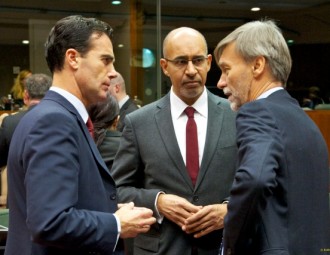EU suspends Belarus sanctions for four months
 photo of European Union. The French European Affairs Minister Harlem Desir is in the center.
photo of European Union. The French European Affairs Minister Harlem Desir is in the center.
The decision was announced by the French European Affairs Minister Harlem Desir.
EU foreign ministers have agreed to suspend sanctions against Belarus, Deutsche Welle informs following a meeting of EU foreign ministers.
"We have taken the decision to suspend the sanctions for the next four months but they can be re-instated immediately if that is required," French European Affairs Minister Harlem Desir told reporters on Monday, following elections that witnessed President Aliaksandr Lukashenka win a fifth term.
Desir said the decision was taken after Belarus' elections on Sunday took place "in the most transparent and calm way possible," referring to previous elections which were marred by violence and the detention of opposition figures.
The suspension is expected to take effect by January.
However, German Foreign Minister Frank-Walter Steinmeier said the elections weren't perfect. "The elections naturally do not meet the international standards that we set ourselves," Steinmeier said in a statement.
The German Foreign Ministry also issued a statement on the elections following the announcement of the results, which said, "The elections are a test case for the possible development of our cooperation with Belarus."
"We expect that repressions such as those seen in 2010 will not be allowed to recur," the statement added.
Meanwhile, the Organization for Security and Cooperation in Europe (OSCE), which monitored Sunday's elections, shared similar criticisms of Lukashenka's win at the polls.
"Some significant problems, particularly during the counting and tabulation of votes, undermined the integrity of the election," the OSCE noted in a statement. "The counting process was assessed negatively in 30 percent of stations observed, indicating significant problems."
-
03.01
-
07.10
-
22.09
-
17.08
-
12.08
-
30.09








































